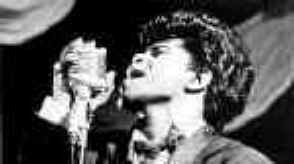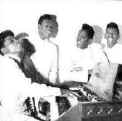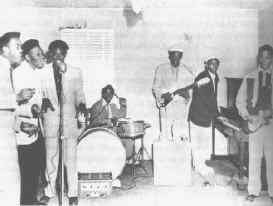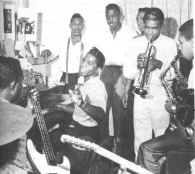James Brown

Probably the single most popular black artist among blacks till
the mid '70s, James Brown may very well have been the last
vaudeville performer, with is high powered, histrionic, and
intensely dramatic stage show. James Brown was perhaps the best
known and clearly the most successful black entertainer of the
Sixties and the early Seventies

Born May 3, 1933 in Barnwell, South Carolina,
Brown took up keyboards, then drums and bass at an early age.
Dropping out of school in the seventh grade Brown picked cotton,
shined shoes, danced for pennies in the streets of Augusta,
Georgia and stole. Convicted of armed robbery at the age of 16,
he spent three years in a juvenile detention facility. It was
there that he met Bobby Byrd, who with his family gospel group
visited the institution to perform. Byrd's family helped get
Brown released by taking him in and getting him a job. brown
tried semiprofessional sports, first as a boxer, then as a
baseball pitcher, but a leg injury ruined his chances of going pro. In the meantime,
Brown and Byrd put together a gospel group, that performed under
a number of names at the Mt. Zion Baptist Church in Tocca,
Georgia and at auditoriums in the area. Byrd and Brown sang duets
with three or four other members singing background vocals and
harmonies. After seeing a rock and roll show featuring Hank
Ballard and the Midnighters, Fats Domino, and others Brown and
Byrd quit gospel music, transforming the group into the Flames.
Each Flame sang, danced and played an instrument or two. Brown's
were piano and drums. Byrd played keyboards and vocals and would
remain Brown's sideman for the next three plus decades.
injury ruined his chances of going pro. In the meantime,
Brown and Byrd put together a gospel group, that performed under
a number of names at the Mt. Zion Baptist Church in Tocca,
Georgia and at auditoriums in the area. Byrd and Brown sang duets
with three or four other members singing background vocals and
harmonies. After seeing a rock and roll show featuring Hank
Ballard and the Midnighters, Fats Domino, and others Brown and
Byrd quit gospel music, transforming the group into the Flames.
Each Flame sang, danced and played an instrument or two. Brown's
were piano and drums. Byrd played keyboards and vocals and would
remain Brown's sideman for the next three plus decades.

Original Flames 1956: James Brown on drums and Bobby Byrd on
piano
From their Macon Georgia base, the Flames had
been touring the South when Ralph Bass, head of Federal Records,
signed them in 1956. "Please, Please Please," their
first Federal single, was a big hit regionally and eventually
sold a million copies. Subsequent releases in the same gospel
influenced yet distinctly rougher R&B style made Brown a
regional star until "Try Me" (#1 R&B, #48
pop).became a national hit in 1958.

In the studio during the early days
Brown had become the leader of the groups now
called the Famous Flames. Guided by  Universal
Attractions director Ben Bart, Brown created the James Brown
Revue. The show was precisely choreographed, with Brown pumping
his hips, twisting on one foot, and doing the splits as the
troupe would execute their own intricate steps. Sweating off
seven pounds a night, breaking box office records In every major
black venue in America, Brown was nicknamed "Mr.
Dynamite" and was called "The Hardest Working Man in
Show Business".
Universal
Attractions director Ben Bart, Brown created the James Brown
Revue. The show was precisely choreographed, with Brown pumping
his hips, twisting on one foot, and doing the splits as the
troupe would execute their own intricate steps. Sweating off
seven pounds a night, breaking box office records In every major
black venue in America, Brown was nicknamed "Mr.
Dynamite" and was called "The Hardest Working Man in
Show Business".
Brown's band became one of the best in the
business. He wanted to showcase them on his records, but Federal
refused to let him use them on his records, so he arranged for
them to record for another company as Nat Kendrick and the Swans.
The resulting instrumental hit "Mashed Potatoes"
convinced King, Federal's parent company, to take over Brown's
contract and sign the James Brown Band for Brown's sessions as a
separate act. From then on Brown concentrated on pared down jump
and shout dance music.
Brown's Live at the Apollo, recorded in
Harlem in 1962 sold a million copies, unprecedented for a black
music album. Frustrated by King's failure to reach into the white
market, Brown and Byrd formed Fair Deal Productions. Fair Deal
released "Out of Sight" through Smash Records was a #1
R&B, #24 pop hit.


 injury ruined his chances of going pro. In the meantime,
Brown and Byrd put together a gospel group, that performed under
a number of names at the Mt. Zion Baptist Church in Tocca,
Georgia and at auditoriums in the area. Byrd and Brown sang duets
with three or four other members singing background vocals and
harmonies. After seeing a rock and roll show featuring Hank
Ballard and the Midnighters, Fats Domino, and others Brown and
Byrd quit gospel music, transforming the group into the Flames.
Each Flame sang, danced and played an instrument or two. Brown's
were piano and drums. Byrd played keyboards and vocals and would
remain Brown's sideman for the next three plus decades.
injury ruined his chances of going pro. In the meantime,
Brown and Byrd put together a gospel group, that performed under
a number of names at the Mt. Zion Baptist Church in Tocca,
Georgia and at auditoriums in the area. Byrd and Brown sang duets
with three or four other members singing background vocals and
harmonies. After seeing a rock and roll show featuring Hank
Ballard and the Midnighters, Fats Domino, and others Brown and
Byrd quit gospel music, transforming the group into the Flames.
Each Flame sang, danced and played an instrument or two. Brown's
were piano and drums. Byrd played keyboards and vocals and would
remain Brown's sideman for the next three plus decades.

 Universal
Attractions director Ben Bart, Brown created the James Brown
Revue. The show was precisely choreographed, with Brown pumping
his hips, twisting on one foot, and doing the splits as the
troupe would execute their own intricate steps. Sweating off
seven pounds a night, breaking box office records In every major
black venue in America, Brown was nicknamed "Mr.
Dynamite" and was called "The Hardest Working Man in
Show Business".
Universal
Attractions director Ben Bart, Brown created the James Brown
Revue. The show was precisely choreographed, with Brown pumping
his hips, twisting on one foot, and doing the splits as the
troupe would execute their own intricate steps. Sweating off
seven pounds a night, breaking box office records In every major
black venue in America, Brown was nicknamed "Mr.
Dynamite" and was called "The Hardest Working Man in
Show Business".